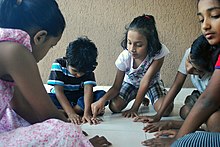
A counting-out game or counting-out rhyme is a simple method of 'randomly' selecting a person from a group, often used by children for the purpose of playing another game. It usually requires no materials, and is achieved with spoken words or hand gestures. The historian Henry Carrington Bolton suggested in his 1888 book Counting Out Rhymes of Children that the custom of counting out originated in the "superstitious practices of divination by lots."
Many such methods involve one person pointing at each participant in a circle of players while reciting a rhyme. A new person is pointed at as each word is said. The player who is selected at the conclusion of the rhyme is "it" or "out". In an alternate version, the circle of players may each put two feet in and at the conclusion of the rhyme, that player removes one foot and the rhyme starts over with the next person. In this case, the first player that has both feet removed is "it" or "out". In theory the result of a counting rhyme is determined entirely by the starting selection (and would result in a modulo operation), but in practice they are often accepted as random selections because the number of words has not been calculated beforehand, so the result is unknown until someone is selected.
A variant of counting-out game, known as the Josephus problem, represents a famous theoretical problem in mathematics and computer science.
Examples
Several simple games can be played to select one person from a group, either as a straightforward winner, or as someone who is eliminated. Rock, Paper, Scissors, Odd or Even and Blue Shoe require no materials and are played using hand gestures, although with the former it is possible for a player to win or lose through skill rather than luck. Coin flipping and drawing straws are fair methods of randomly determining a player. Fizz Buzz is a spoken word game where if a player slips up and speaks a word out of sequence, they are eliminated.
Common rhymes

(These rhymes may have many local or regional variants.)
- Eeny, meeny, miny, moe
- 10 Little Indians
- Five Little Ducks
- Ip dip
- One, Two, Three, Four, Five
- Tinker, Tailor (traditionally played in England)
- Yan Tan Tethera
- Inky Pinky Ponky
- One potato, two potato
- Ink-a-dink
- Akka bakka bonka rakka
- En Den Dino
Cultural references
Marx Brothers
A scene in the Marx Brothers movie Duck Soup plays on the fact that counting-out games are not really random. Faced with selecting someone to go on a dangerous mission, the character Chicolini (Chico Marx) chants:
- Rrringspot, vonza, twoza, zig-zag-zav, popti, vinaga, harem, scarem, merchan, tarem, teir, tore...
only to stop as he realizes he is about to select himself. He then says, "I did it wrong. Wait, wait, I start here", and repeats the chant—with the same result. After that, he says, "That's no good too. I got it!" and reduces the chant to
- Rrringspot, buck!
And with this version he finally manages to "randomly" select someone else.
Seinfeld
A version of a counting game "ink-a-dink" features in the Seinfeld episode "The Statue." The relevant scene includes a discussion between the characters of Jerry and George if the person who is "it" is the "winner" or the "loser":
- JERRY: Alright, let's go. Hey, you know, you owe me one.
- GEORGE: What?
- JERRY: The Ink-a-dink.. you were It.
- GEORGE: It's bad?
- JERRY: It's very bad.
See also
References
- Bolton, Henry Carrington (1888). Counting Out Rhymes of Children. Elliot Stock. p. v. .
- Opie, I & P (1970). Children's Games in Street and Playground. Oxford at the Clarendon Press. p. 28. ISBN 9781782500322.
Fanciful as it would seem to someone who had never been a child, the normal way the young decide who is to have the unpopular part in a game is to form the players up in a line or circle, and count along the line the number of counts prescribed by the accented syllables of some little rhyme.
- Macaulay, Ronald (2006). The Social Art: Language and Its Uses. Oxford University Press. p. 189. ISBN 0-19-518796-2.
inky pinky ponky counting out.
- Abrahams, Roger D.; Rankin, Lois (2013-12-18). Counting-Out Rhymes: A Dictionary. University of Texas Press. ISBN 978-0-292-71143-3.
- "Transcript of Duck Soup". Script-O-Rama.com. The bracketed "words" are not in the published script but are said in the movie; they're required for scansion and rhyme.
- "Seinfeld" The Statue (TV Episode 1991) - IMDb, retrieved 2022-01-03
External links
Portals:- Videos of "choosing songs" a.k.a. Counting rhymes
- Selection Rhymes at the BBC's project h2g2
- Counting rhymes and other songs for counting in traditional music from county of Nice, France.
| Children's music and poetry | |
|---|---|